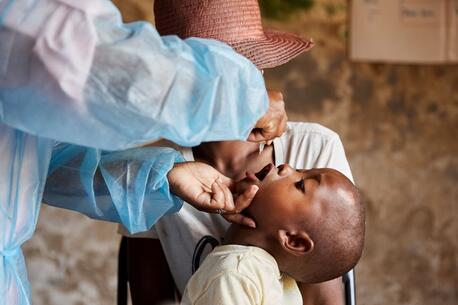
Yemen's Community Midwives Protect the Lives of Newborns and Mothers
"As a midwife, my job is to save two people ... the mother and the newborn," says Akhlaq Mohammed Atteq Humadi, a midwife from Rusabah village, Yemen.
Yemen's newborn mortality rate — 26 per 1,000 live births — is considerably higher than the global average of 17 deaths per 1,000 live births in 2019. A lack of qualified medical care combined with an absence of access to accurate information about a healthy pregnancy, breastfeeding and newborn care endangers the lives of both mothers and babies.
At the UNICEF-supported midwife training program in Dhamar, a city in southwestern Yemen, nurses, doctors' assistants and other health care workers learn about preparing women for safe childbirth, resuscitating newborns and educating new mothers on how to care for babies during the critical first days of life, including the importance of handwashing, breastfeeding, regular medical check-ups and vaccination.
Watch the video to see a midwife training program in action:
"False ideas around childbirth can harm the newborn, for example, the belief that you should not breastfeed immediately after birth, or that you should give the child sugar," says midwife trainer Amani Ahmed. "Training people is good for communities, because it reduces the number of deaths and because trainees can share their newly acquired knowledge with those around them."
"My message to every mother, father and all family members when the mother gives birth at home is to call a midwife or a nurse, or to refer the case to a hospital," says Akhlaq Mohammed.
Yemen is the most difficult place in the world to be a child. UNICEF and partners are on the ground, working to protect children's lives and futures. You can help.
Learn more about how UNICEF is helping children and families in Yemen.
Top photo: At a UNICEF-supported midwife training program in Dhamar City in southwestern Yemen, participants strengthen their skills and learn about preparation for childbirth, the resuscitation and care of newborns, the importance of handwashing and the basics of breastfeeding. © UNICEF/UN0522961/Haleem. Video edited by Tong Su for UNICEF USA.
HOW TO HELP
There are many ways to make a difference
War, famine, poverty, natural disasters — threats to the world's children keep coming. But UNICEF won't stop working to keep children healthy and safe.
UNICEF works in over 190 countries and territories — more places than any other children's organization. UNICEF has the world's largest humanitarian warehouse and, when disaster strikes, can get supplies almost anywhere within 72 hours. Constantly innovating, always advocating for a better world for children, UNICEF works to ensure that every child can grow up healthy, educated, protected and respected.
Would you like to help give all children the opportunity to reach their full potential? There are many ways to get involved.





